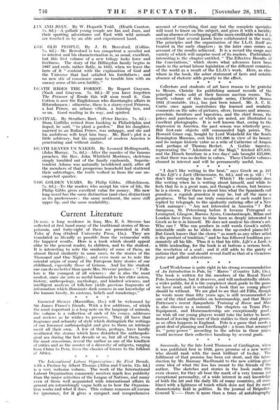" I don't like writing in the heat," says Grock
on p. 241 of his Life's a Lark (Heinemann, 8s. 6d.), and on p. viii : " I don't like writing in the least." Which ? He certainly does like writing when he is writing about himself, and while he feels that he is a great man, not though a clown, but because he is a clown. For there is about him what the Spaniards call grandeza, a roguish grandeza it may be, but all the same a greatness. Who but one truly conscious of such could have replied by telegraph, to the opulently, enticing offer of a New York manager : Am not interested in America " ? But Saragossa, St. Petersburg before it became Petrograd or Leningrad, Glasgow, Buenos Ayres, Constantinople, Milan and London have from time to time been as deeply interested in Grock as he is in himself. He does not analyse his clown's art. Who can ? Who can produce in cold words Grock's subtly inimitable smile as he slides down the up-ended piano-lid ? But Grock knows that the clown " as much as any other artist is the product of tradition," and he has followed tradition pas- sionately all his life. Thus it is that his title, Life's a Lark, is a little misleading, for the book is at bottom a serious book, the revelation of a soul ; and it still adds to the gaiety of nations that the soul should reveal itself as that of a vivacious jester and gallant adventurer.
• * * *






































 Previous page
Previous page